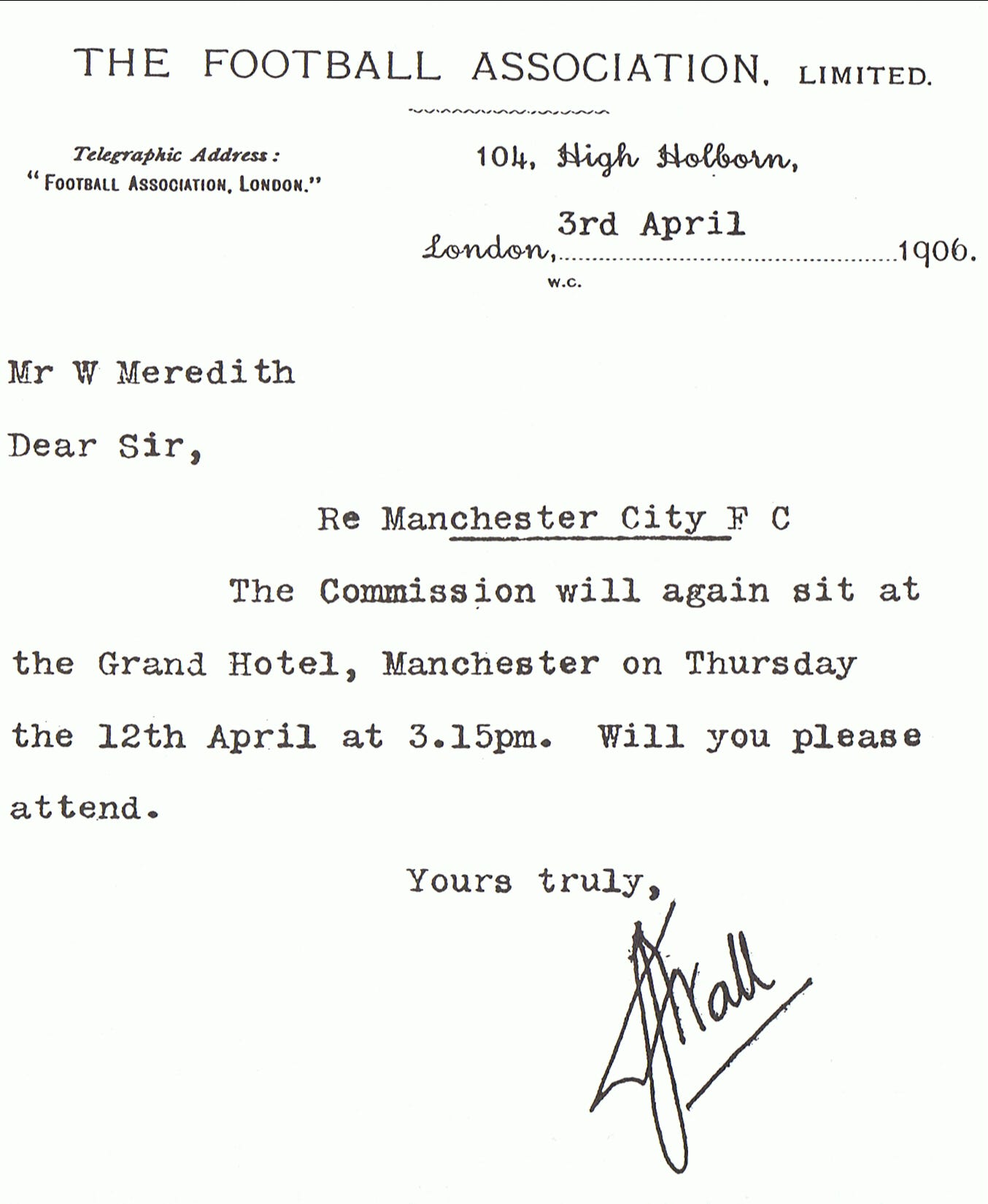When City Fell Foul of Edwardian Financial Fair Play (Pt 10)
Ten: The Meredith Muddle
City didn’t make any notable signings for the 1905-06 season. They had plenty of money in the bank, but the fear of breaking FA rules left them unwilling to pay the signing-on fees players now expected.
Deprived of their most influential player, Billy Meredith, for the entire season, City had fallen to 11th place by mid-December. But it was Meredith’s reaction to the ban that was causing the most concern at the club.
Early in the season manager Tom Maley had sent the player a letter assuring him that ‘he was not going to lose out financially’. But the club’s refusal to further breach FA rules had led to heated aruguments at the Hyde Road ground between Meredith and directors. Meredith later wrote:
‘Though the FA suspened me, I felt strongly that my club would see that I was not the loser financially. At the beginning of the trouble it looked as though the club was going to recognise this, but later I found them shilly-shallying and putting me off until I got tired.’
These arguments had been overheard by the FA’s auditor Tom Hindle, who pressed the club to report the matter. In February Maley reluctantly wrote to the FA:
‘I am instructed by my directors to bring to the notice of your Association the conduct of William Meredith, a player of this club at present under suspension. This player has been in attendance at almost all the principal matches at our ground and invariably frequented the dressing room and offices despite requests not to do so… Periodically Meredith has approached the board for payment of wages. The refusal of the board to lend itself to any illicit or illegal practices led to many threats by the player… the rigid observation of the rules has ultimately silenced the player but nevertheless it has been for the board a very trying time…’
But despite the off-field turmoil, Maley’s side—to the surprise of many—was once again challenging for the title. On 3 March a 1-0 win away at Anfield—City’s eighth win in 10 games and their first ever victory at the ground—put them just three points off leaders Liverpool with two games in hand.
Three spectators in the 27,000 capacity crowd were hospitalised during the game after the weight of fans on the roof of one stand caused part of it to collapse on them. The incident was perhaps also symbolic, as the roof was about to cave in at Manchester’s leading club.
On 5 March Athletic News reported:
‘The Consultative Committee of the Football Association have appointed Messrs. J. C. Clegg, Charles Crump and C. W. Alcock the commissioners to inquire into the report upon the allegations of misconduct which Manchester City have made against William Meredith, the captain, who was suspended last August.
‘What’s in the wind?’ Empire News asked. ‘Whilst there are many vague rumours, there is little in the nature of solid fact that can be gripped by the casual reader.’
But the FA were now relentlessly building their case. On 2 April Athletic News reported that, following an FA visit to Hyde Road,
‘Several important documents were handed in and impounded, and generally we should say the Commissioners, much as they know of football, were considerably astonished.’
The following day, the FA Commission called Meredith in.
According to John Harding’s Football Wizard: The Billy Meredith Story, City’s disgruntled captain, now facing a life ban, was prepared to give the FA what they wanted:
‘Meredith, it was said, was volunteering information that went well beyond the question of his current misdemeanours. He was claiming that he had been promised payments of specific sums if he held his tongue.‘
But most ominously for City, Meredith had hard evidence that the club had breached the maximum wage rules.
Not trusting verbal guarantees, Meredith had been the only City player to insist that secret wage payments were put in writing. In April 1902 chairman John Chapman had signed an agreement to pay Billy Meredith £6 a week for the 1902-03 season. Three months later, after Chapman had stood down as chairman, Meredith received another written agreement, signed by new chairman Edward Hulton and director Charles Waterhouse, in the presence of finance director George Madders, stating that they,
‘do take over for and on behalf of the said Club the said liability under the agreement and agree to hold the said John Edward Chapman harmless in respect thereof.’
Every City player and official was called in by the Commission. Unsurprisingly, performances on the pitch began to suffer. Five defeats in seven games saw them slip out of the title race.
At the end of the season City’s directors attempted to cut their ties with Meredith, placing him on the transfer list for £500 and signing a replacement right winger, George Stewart, from Hibernian for £650.
A series of shareholder meetings were called questioning the decision. But a sense of impending doom was now gripping Hyde Road. On 28 May an Athletic News cartoon captured the worst fears of players and directors.
Three days later the FA published its report.
Its findings would alter the balance of power in Manchester football for years to come.
Part Eleven will be published on Saturday 11th May.
You can subscribe for free, below, and have it sent straight to your inbox.






Interesting stuff yet again , makes you wonder why city were so stupid as to put details of dodgy dealing down on paper ! I read about the great Preston team of the same time enticing the best players from Scotland . They promised jobs for life to the families of the players and the players after retirement in the Lancashire mills that were owned by Preston directors ! A legal way of getting around the max wage ?